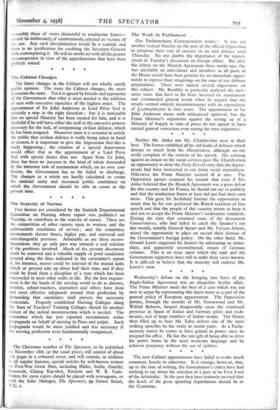Neither Mr. Attlee nor Mr. Chamberlain were at their best.
The former exhibited all his old faults of delivery which detract so much from his effectiveness, although no one could complain of the content of his speech. His warning against an attack on the social services gave Mr. Chamberlain an opportunity to deny the Daily Herald story that the depart- ments had been instructed to cut down social expenditure. Otherwise the Prime Minister seemed ill at ease. The Opposition parties resented his remark that even if Mr. Attlee believed that the Munich Agreement was a great defeat for this country and for France, he should not say so publicly and that the totalitarian States at least did not foul their own nests. This gave Sir Archibald Sinclair the opportunity to retort that he for one preferred the British tradition of free speech and that the people of this country meant to keep it and not to accept the Prime Minister's totalitarian standards. During the time that remained some of the dissentient Conservatives, who had failed to catch the Speaker's eye last month, notably General Spears and Mr. Vyvyan Adams, seized the opportunity to place on record their distrust of the Government's foreign policy. On the other hand, Mr. Oswald Lewis staggered his hearers by advocating an imme- diate, and apparently unconditional, return of German colonies. This is an issue upon which the rank and file Government supporters have still to make their views known. It is difficult to believe that the majority will endorse Mr. Lewis's view.
* * * *










































 Previous page
Previous page